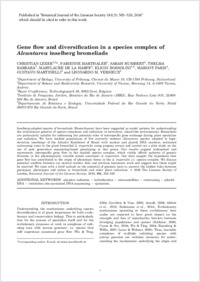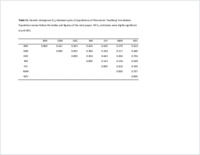Gene flow and diversification in a species complex of Alcantarea inselberg bromeliads
- Lexer, Christian Department of Biology, University of Fribourg, Switzerland - Department of Botany and Biodiversity Research, University of Vienna, Austria
- Marthaler, Fabienne Department of Biology, University of Fribourg, Switzerland
- Humbert, Sarah Department of Biology, University of Fribourg, Switzerland
- Barbará, Thelma Department of Biology, University of Fribourg, Switzerland
- Harpe, Marylaure de La Department of Biology, University of Fribourg, Switzerland
- Bossolini, Eligio Department of Biology, University of Fribourg, Switzerland - Bayer CropScience, Gent, Belgium
- Paris, Margot Department of Biology, University of Fribourg, Switzerland
- Martinelli, Gustavo Instituto de Pesquisas, Jardim, Botânico do Rio de Janeiro (JBRJ), Brazil
- Versieux, Leonardo M. Departamento de Botânica e Zoologia, Universidade Federal do Rio Grande do Norte, Brazil
-
21.01.2016
Published in:
- Botanical Journal of the Linnean Society. - 2016, vol. 181, no. 3, p. 505–520
English
Inselberg-adapted species of bromeliads (Bromeliaceae) have been suggested as model systems for understanding the evolutionary genetics of species complexes and radiations in terrestrial, island-like environments. Bromeliads are particularly suitable for addressing the potential roles of interspecific gene exchange during plant speciation and radiation. We have studied populations of five narrowly endemic Alcantarea species adapted to high-elevation inselbergs of the Atlantic Rainforest of Brazil with nuclear and plastid DNA markers, estimated outcrossing rates in the giant bromeliad A. imperialis using progeny arrays and carried out a pilot study on the use of next generation sequencing-based genotyping in this group. Our results suggest widespread and asymmetric interspecific gene flow in the studied species complex, which visibly affects patterns of genetic diversity in the phenotypically variable mixed outcrosser A. imperialis. Our data support the hypothesis that gene flow has contributed to the origin of phenotypic forms in the A. imperialis s.l. species complex. We discuss potential conflicts between our neutral marker data and previous taxonomic work and suggest how these might be resolved. We close with a brief outlook on the potential of genomic tools to uncover the hidden links between genotypes, phenotypes and niches in bromeliads and other plant radiations.
- Faculty
- Faculté des sciences et de médecine
- Department
- Département de Biologie
- Language
-
- English
- Classification
- Biological sciences
- License
-
License undefined
- Identifiers
-
- RERO DOC 277325
- DOI 10.1111/boj.12372
- Persistent URL
- https://folia.unifr.ch/unifr/documents/305251
Other files
Statistics
Document views: 144
File downloads:
- pdf: 235
- Supplementary material: 132

